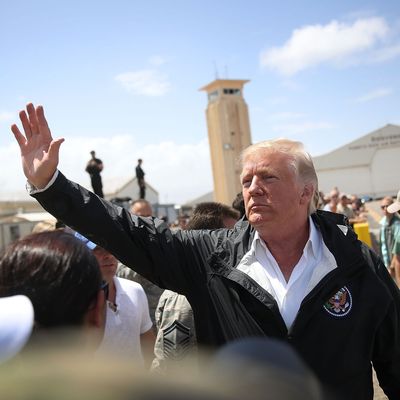
The aftermath of Hurricane Maria has inspired President Trump to say a number of weird, creepy, and resentful things. In this way, of course, it is not a completely unique event. But the particular creepiness of Trump’s utterances has revealed something more profound about his worldview than previous events have managed to draw out of him.
Trump’s view of the role of government has always diverged from standard-issue Republican dogma. (This is one of the reasons he defeated the 17 standard-issue Republicans who opposed him in the primary.) That dogma was recently articulated by Wisconsin Republican senator Ron Johnson, who recently told an audience he does not see access to medical care, or any material human need, as a basic right. “I think it’s probably more of a privilege,” Johnson said. “Do you consider food a right? Do you consider clothing a right? Do you consider shelter a right? What we have as rights are life, liberty, and the pursuit of happiness. We have the right to freedom. Past that point, everything else is a limited resource that we have to use our opportunities given to us so that we can afford those things.”
Food, shelter, and medical care are not “limited” in any inherent sense. (We have sufficient resources to supply them for every American.) But Johnson is invoking a vein of economic libertarianism which denies public responsibility to provide even the basics of survival. American conservatism (but not the forms of conservatism found in almost any other country) takes the principle of personal responsibility to to this extreme point. The role of the state is to provide open markets, and if you fail to earn enough for food, clothing, or a roof over your head, that is your own fault.
Trump has never articulated this form of libertarianism. Instead he has usually emphasized the sales pitch Republicans use to make their libertarianism acceptable to the public. He promised to repeal Obamacare and replace it with “something terrific” that would “take care of everybody” — a more blunt but essentially faithful translation of the Republican promise to repeal Obamacare and replace it with a plan that would feature lower premiums, deductibles, as well as access to care for people with expensive medical conditions.
Puerto Rico’s disaster has made Trump think about the role of the state in furnishing basic survival goods. He quickly adopted positions far to the right of even the most hardened libertarian ideologue. Trump assailed “ingrates” who “want everything to be done for them when it should be a community effort.” How could people possibly take personal responsibility when they lack access to electricity, drinking water, and even their own money? He mused that Puerto Rico is “throwing our budget out of whack,” a strange complaint from a man who frequently calls for the “the biggest tax cut we’ve ever had.”
The Trump who complained about lazy Puerto Ricans who needed to pick themselves up by their bootstraps rather than drain the Treasury was the familiar race-baiter. But there was also another dynamic on display: Trump’s habit of personalizing every case to an almost pathological degree. What set off the president was less the formal position of Puerto Rican politicians and their constituents (that they needed help to recover from a natural catastrophe) than the fact that they complained about it.
Trump views his powers as president in near-absolute terms. “I will give you everything,” he promised during the campaign. “I will give you what you’ve been looking for for 50 years. I’m the only one.” In this sense, Trump occupies the opposite end of the ideological spectrum from the small-government conservatism of his party. He imagines himself as a monarch, dispensing favors to grateful subjects and punishing the ungrateful. He has promised to give the people “everything,” but if he sees them expecting to be given “everything,” he will rage at them.
When Puerto Rican officials grasped the dynamic, and dutifully praised their commander-in-chief for his attentive and not-at-all-incompetent handling of the disaster, it set the stage for Trump to flip from scornful race-baiting autarch to generous favor-dispensing autarch. The scene of the president tossing out paper towels to his citizens like they were contest winners recalled Immortan Joe favoring his subjects by turning on the water spigot.
“I am your redeemer. It is by my hand you will rise from the ashes of this world!” is not something Trump would say — but only because the language is too elegant to have come out of his mouth. The sentiment is perfectly his own. The subject who gives Trump his gratitude will have everything. And the unappreciative one will have nothing.






























